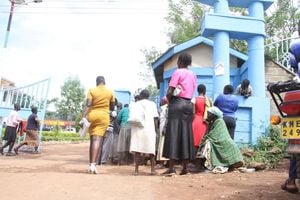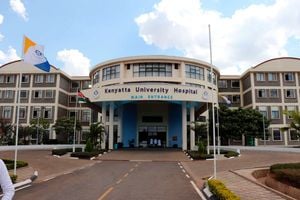
Before they met the same fate, Peter Muchiri, Kelvin Mulerwa Mugambi, Joseph Temba and Samson Njuguna did not know each other or have anything in common.
Now, in an unprecedented twist of fate, they are all locked inside the walls of the Kenyatta National Hospital (KNH). They are among 23 patients who remain in the facility's wards, not only because they have been there for what seems like an eternity, but also because they have been abandoned by their families or have nowhere to call home.
Health facilities are reserved for the sick, and revered by the healthy. Their corridors are usually characterised by pin-drop silence, occasional wailing, and the echoes of uncertainty and hushed whispers of vulnerability are always in the air.
The very mention of hospitals and/or health facilities evokes a visceral reaction and a cocktail of emotions ranging from anxiety to fear.
Until 2017, Muchiri never imagined that his life would be confined to the walls of KNH.
The 33-year-old was admitted to KNH in 2018, but the year before that he had been admitted to Mbagathi Level 5 Hospital.
In 2017, he left work to go home, but stumbled and fell, and was rushed to Mbagathi Hospital. From that moment on, he recalls, he started coughing. But what complicated the matrix was the presence of blood in the cough. That's all he remembers of the moment that changed his life forever. It was just an accident and he hoped against hope that he would be out of hospital in a few days.
But hours turned into days. Days turned into months. And half a year later, he was still in Mbagathi Hospital. By then he had recovered, but he lacked the financial resources to pay the mounting bills.
A social worker, he said, tried unsuccessfully to find ways to get him off the hook. But just when he thought he was off the hook, he fell ill again – this time with a more serious complication – and had to be transferred to KNH in August 2018.
For the past five years, his life has been confined to the grounds of Kenyatta National Hospital.
Muchiri suffers from post-tuberculosis pulmonary fibrosis, or lung failure, and as a result he's constantly on an oxygen concentrator – a medical device that helps a person breathe – which he'll need once he leaves the hospital. But that's only half the battle.
With his world turned upside down, Muchiri says he has no place to call home. And with the cost of living skyrocketing, he knows it will be extremely difficult to afford the medical equipment on which his life now depends.
For the past five years, the walls of Ward 7 have been his only home.
“Life is tough [here]. I live this way because I don’t have anywhere else to go,” he narrates, adding that he is an orphan.
“My mum died when I was bedridden at the hospital and I did not attend the funeral,” he continues. And his only surviving brother is not financially stable.
“I’ll appreciate any assistance, especially a home and an oxygen concentrator machine.”
Muchiri gave us a contact person who he said was his only brother. He added that his brother calls him sometimes but does not visit him in the hospital. When we called the number, a woman answered and had no idea who Muchiri was.
And while he has told KNH social workers that his original home is in Nyandarua, Muchiri maintains that he has no home other than here in Nairobi, where he grew up.
Sitting next to him is 32-year-old Joseph Temba, who suffers from the same condition – lung failure.
“My struggles began in 2017. That’s when I was diagnosed with TB. Since then, I’ve been in and out of the hospital,” he says. “In 2021, I contracted Covid-19 and my health worsened…as a result, I’ve lived here since then.”
He explains that he is technically surviving, adding that he had “been living in the streets since 2012".
The KNH was able to trace Temba’s home to Malakisi in Sirisia, Bungoma County. Temba says he ran away from home in 2012. His first stop was the streets of Eldoret before moving to Nakuru and eventually arriving in the capital city, he explained.
When he fell ill, his street family took him to the hospital but never returned to check on him.
“I just have to survive here, persevering, because I can’t leave the hospital without the oxygen machine… If I get the machine, perhaps… But I don’t think I’ll be safe on the streets with the machine. I was tortured when healthy, now that my health is failing me, I’m even more vulnerable,” he explains.
Adjacent to Ward 7 is the Orthopaedic Ward where Kelvin Mulerwa Mugambi, from Tigania East, Meru County, has been bedridden since September 7, 2020. He is a referral case from Nkubu Hospital. He remembers little to nothing about how he ended up at the level 6 facility.
“I don’t remember [anything] since I was unconscious,” he says.
But how did his life trajectory change? It was on a Sunday morning, around 10am, when tragedy struck, he says.
“I was harvesting Hass avocados when I slipped and fell, then became unconscious only to wake up in a hospital to find that my neck was reinforced with metals,” he says.
“Since the ordeal, only my sister has visited. But it's been long since she stopped by. I don’t even remember the last time she was here. But she is also not well off financially.”
Then there is 27-year-old Samson Njuguna, who is registered as an oral feeding-assisted patient. He is a victim of a train accident in Nairobi’s Land Mawe area, and has been in this ward since October 16, 2022
“It was on a Friday night…I was out gallivanting,” he said. That is all he knows about how his world turned upside down.
The four are among 23 patients at the country’s largest referral hospital who have been abandoned, while some came in as unknown persons. In such a scenario, the patients become the responsibility of the hospital, a duty that falls to social workers and nurses.
“We usually try to trace their next of kin by taking fingerprints to the National Bureau of Registration, which assists us to get where they come from. We then use provincial administration to trace relatives,” explains Kandie Kelwon, KNH's head of Medical Social Work.
KNH’s Chief Executive Officer Evanson Kamuri added: “Our priority is to make sure the patient is okay because one, this is a government facility. However, when they stay for long they drain the resources.”
The operational costs of abandoned patients, especially those with critical illnesses, are high, he added.
In such cases of abandoned patients, the hospital does its best to locate their homes or relatives so that the patients can be discharged to ease the financial burden on the facility. It is, however, difficult to trace patients who are registered as 'unknown'.
Sometimes, the hospital is forced to use social media to try and trace the patients' relatives. “We put their images on our official FB page,” says Kandie.
Deep in Kaonyweni village in Masinga Constituency, Machakos County, is Mercy Servants of the Poor, a home for the unknown and homeless run by Catholic nuns. This is where many abandoned KNH patients end up.
"Right now, we have 24 [patients, and] 60 per cent under medication because they are chronically sick. 19 are from KNH, one was collected in a lodging in Masinga and four were abandoned at Meru Level 5 Hospital,” says Sister Mary Musembi, the founder of Mercy Servants of the Poor.
“We categorise them as patients because they are sickly. Because of their health condition and being far away from any hospital facility, some don’t live for long."
When they die, Sister Musembi says, “We bury them here because this is the only home they have.”
Two patients were lucky to be reunited with their families, but four have since died.
The few patients we met were not in good condition and spent most of their time indoors.
Before they leave KNH, or other hospitals, the facilities have to process their documentation.
“Before they land here, KNH clears the issue documents. They read 'unknown African man/woman'... If it’s a child, they go to court first then the children's department,” Sister Musembi explains. “Our institution is unique...only caring for the unknown abandoned sick people.”
Before the abandoned patients were brought to the home, which is a private facility, officials realised that medication would be a huge burden.
“The greatest challenge would be the medication cost. So we agreed that KNH provides the drugs,” said Kelwon.
Sister Musembi says, “Ours is to take care of the basic needs and we give them that total love they have lost from their families … We actually restore back lost dignity… When they die, they die holistically."
Most of the abandoned people are children, some were abandoned by their mothers in the hospital and some were picked up by the police. The adults are mostly male patients from Nairobi.
According to Kamuri, the KNH chief executive, the facility has “partnered with many stakeholders, some [of whom] even help us sort out some of these bills”.













